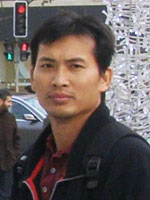Sparking a career combating HIV/AIDS in Cambodia
November / December 2011 | Volume 10, Issue 6

Photo courtesy of
Dr. Chhorvann Chhea
Dr. Chhorvann Chhea, who
received his Ph.D. with Fogarty
support, has become a leader in
the fight against HIV/AIDS in his
native Cambodia.
By Steve Goldstein
Spotting leadership potential among budding researchers is more an art than a science. But when Fogarty grantee Dr. Roger Detels first met a young Cambodian epidemiologist named Chhorvann Chhea, his gut instincts told him Chhorvann had what it takes.
"You can tell when someone has ambition, drive and the commitment to do well," said Detels, who leads Fogarty's AIDS International Training and Research Program (AITRP) grant at University of California, Los Angeles. "I look for that little spark that tells me they will end up being leaders."
The "little spark" ignited a dynamic career for Dr. Chhorvann, as he's known in his home country. Since receiving his Ph.D. at UCLA with Fogarty support in 2009, he's become chief of Cambodia's national HIV/AIDS surveillance unit. He also was recently named director of the National School of Public Health, where he teaches epidemiology and biostatistics.
The Fogarty program, launched in 1988, supports HIV/AIDS-related research training for promising low- and middle-income country researchers. With Detels at the helm of UCLA's grant, about 60 researchers have earned advanced degrees, with more than 100 others receiving short-term instruction. Under the program, trainees study their countries' most pressing questions as part of their learning experience and are required to return home at its conclusion. Chhorvann earned his Ph.D. in epidemiology, with his thesis on the effects of voluntary counseling and testing on the behavior of discordant HIV/AIDS couples in Cambodia.
"Fogarty's programs are very responsive to the individual needs of the countries and allow flexibility to accommodate changing circumstances," Chhorvann observed.
Although Cambodia has seen the prevalence of HIV/AIDS infection drop, the disease continues to be a serious health burden. The number of adults and children living with HIV/AIDS declined to 75,000 in 2007 from 120,000 in 2001, according to WHO estimates, but the disease prevalence increased among children.
Projecting the course of HIV/AIDS transmission in Cambodia is vital to controlling the spread of the disease, Chhorvann stressed. As head of the surveillance unit, he oversees HIV prevalence surveys among different so-called sentinel groups - including sex workers and intravenous drug users - and develops national HIV/AIDS projections for use by policymakers and other organizations working to combat the disease.
His UCLA mentors not only gave him the scientific knowledge for these critical tasks, he said, but also motivated him to help train the next generation of Cambodian scientists. He's currently developing a master's degree program, so his students can benefit from a curriculum that's specially tailored to their country's unique disease priorities and health systems infrastructure.
Chhorvann, 38, already has an impressive list of publications to his credit on disease prevalence, changing behavioral patterns among Cambodian sex workers and early warning indicators of HIV drug resistance, among other topics. One of his papers advises countries with limited resources how to use proxies for HIV incidence "since the true incidence is too expensive to measure correctly," Chhorvann said.
Most recently, he used his training to report on the long-run cost and financing for HIV/AIDS in his country. This project presents different scenarios that the Cambodian government could employ for controlling the spread of the disease.
Chhorvann is also interested in developing the capacity for more research projects in Cambodia, including the potential to compete for NIH funding, and he's expressed a desire to develop a Cambodia Fogarty alumni network.
"Besides my technical knowledge, I have established links with my friends and other UCLA alumni from other countries in the region," he said in an interview. "With my Fogarty friends, I always feel at ease to consult with them when I have any questions."
More Information
To view Adobe PDF files,
download current, free accessible plug-ins from Adobe's website.